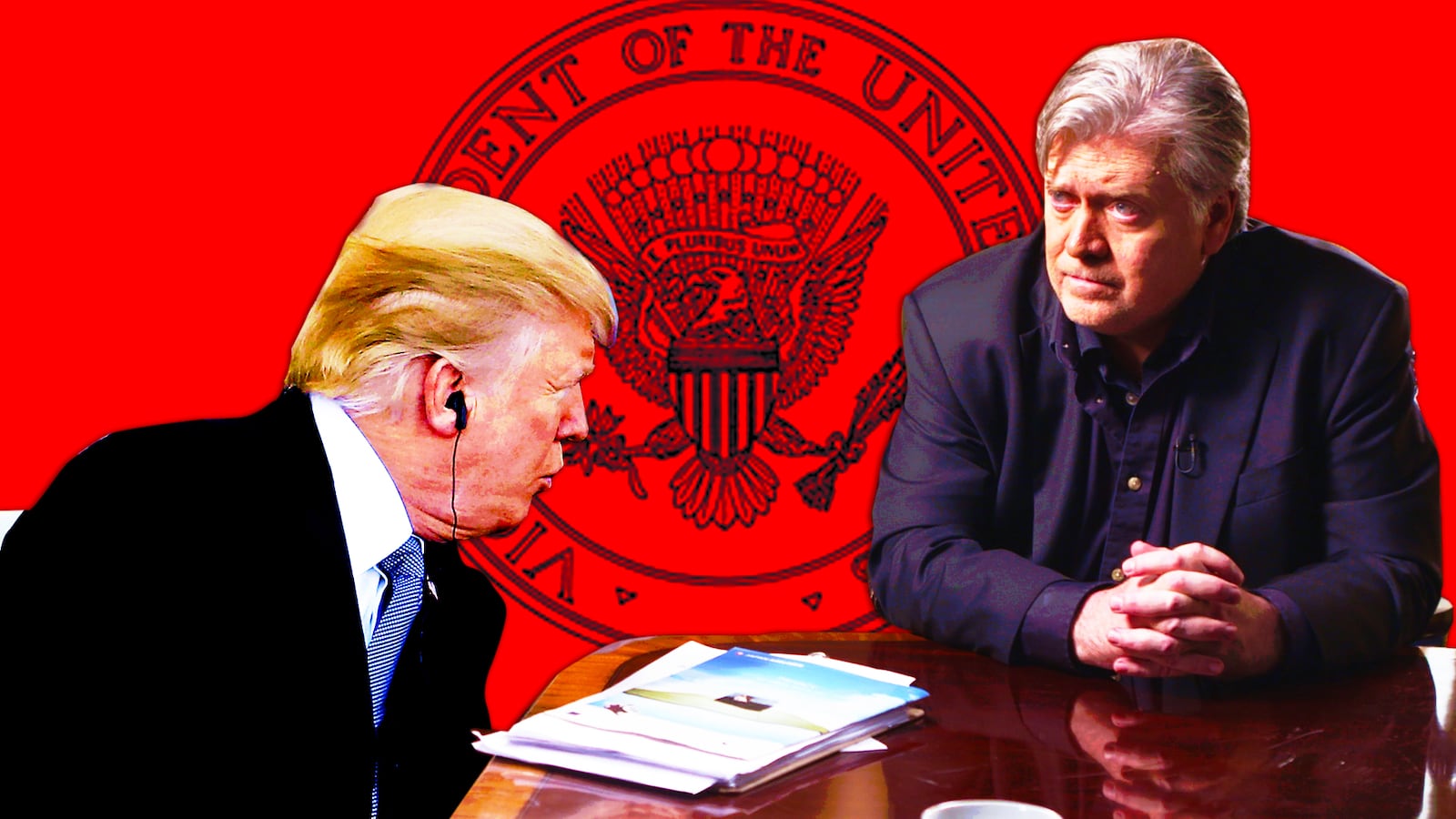Steve Bannon’s efforts to challenge incumbent Republican senators up for re-election, save for Ted Cruz, has little to do with advancing Donald Trump’s wishes or legislative agenda (whatever that is), and everything to do with burning down the house.
Although this revelation might come as no surprise to political cynics, it does go against Bannon’s stated plan, as expressed during his White House exit interviews. “Steve Bannon left the White House because the Trump administration ‘needed a wingman outside’ and now wants to help get allies of President Donald Trump elected to the Senate, he said Tuesday at a global investment conference,” CNN reported last month.
His tune hasn’t changed. “We are declaring war on the Republican establishment that does not back the agenda that Donald Trump ran on,” Bannon told Fox News’ Sean Hannity this week.
If Bannon’s goal were really to be Trump’s “wingman outside,” though, then why would Cruz be excluded from the hit list? Cruz called Trump a “pathological liar” and refused to endorse him at the Republican National Convention. At one point, Trump even threatened to launch a Super PAC against Cruz.
The obvious reason Cruz has been granted immunity is that Bannon’s benefactors, the Mercers, love him. Apparently, Bannon is part of the swamp, because the Mercers’ money defines who he targets and who he doesn’t.
But it doesn’t end there. What’s happening in Utah is even more confusing—if viewed from Trump’s perspective. With Steve Bannon’s help, Boyd Matheson, a former chief of staff to Sen. Mike Lee, is considering running against Utah Sen. Orrin Hatch. According to Politico, “When they huddled in Washington last week, Matheson and Bannon discussed how a 2018 campaign would play out.”
It may well be time for Hatch to go—he’s 83 and seeking his eighth term—and Matheson might be a fine conservative, but it’s doubtful this has anything to do with Trump’s wishes. Hatch has been pretty positive about Donald Trump—maybe even overly so. As Roll Call reported, “Hatch not only worked to support Trump in the Beehive State, he also helped in neighboring states with significant Mormon populations, uneasy over Trump’s personal values and background.”
And while Hatch was helping Trump get elected, Matheson not only predicted that Evan McMullen could beat Trump and Hillary in Utah, but he also criticized Trump (albeit in a veiled way) for immorality. “It doesn’t matter if it’s Trump or Clinton, Utahans are saying, ‘No, that’s not what leadership looks like to us,’” Matheson said. And just weeks before the general election, Matheson also noted that “there are likely several million of those primary voters who now also question whether Mr. Trump and the GOP represent them and their values.”
So Bannon is ostensibly going to help oust an incumbent senator who has been pretty favorable to Trump—and swap him with a Lee-Cruz loyalist who was criticizing the president weeks before the November election? I’m all for loyalty, but the problem here is that it is very selectively enforced.
The point here is that Bannon’s project has nothing to do with advancing Trumpism, and everything to do with ousting establishment incumbents—regardless of merit or devotion to Trump. There’s nothing inherently wrong with this, but I think it has been largely overlooked.
Reportedly, the criteria for Bannon to support a candidates is that they (a) must oppose Mitch McConnell as Majority Leader and (b) support ending the legislative filibuster.
Trump is an advocate of doing away with the filibuster, and has recently shown disappointment in McConnell’s failure to repeal and replace Obamacare. But if Trump wants to get things done in the near future, he will need the support of senators like McConnell and Hatch and Bob Corker (whom Bannon is calling on to resign). In the long run, it’s possible that Bannon will usher in a new wave of conservative leaders to replace the tired and old (once upon a time, Hatch was viewed as a young, rabble-rousing, “New Right” conservative). In the short run, Bannon is making it even harder for Trump to enact his agenda. What is more, he could also cost the GOP seats—and maybe even the majority—if he helps unelectable Republican candidates knock off or weaken incumbent senators like Jeff Flake in Arizona or Dean Heller in Nevada.
As was the case with Bannon’s backing of Roy Moore for Senate in the Alabama primary against Trump’s endorsed candidate Luther Strange, this is an example of Bannon giving Trump what he thinks he needs, if not what the president actually wants.
While Trump and the Republicans ostensibly want to put some points on the board (tax reform, for example), Bannon is an insurrectionist who has much grander, revolutionary goals. They believe they have to destroy the village in order to save it. “Explaining to Mercer and Bannon they could hurt the GOP is beside the point,” says conservative Bill Kristol. “They want to hurt—even destroy—the existing Republican Party.”
With friends like this, Trump might not need any enemies.





